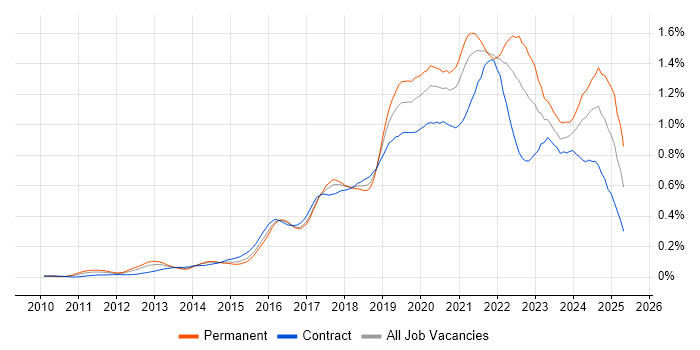Cloud Engineer
Central London > City of London
The median Cloud Engineer salary in the City of London is £77,500 per year, according to job vacancies posted during the 6 months leading to 31 May 2025.
The table below provides salary benchmarking and summary statistics, comparing them to the same period in the previous two years.
|
|
6 months to
31 May 2025 |
Same period 2024 |
Same period 2023 |
| Rank |
112 |
141 |
177 |
| Rank change year-on-year |
+29 |
+36 |
+7 |
| Permanent jobs requiring a Cloud Engineer |
27 |
37 |
53 |
| As % of all permanent jobs advertised in the City of London |
1.38% |
1.11% |
1.18% |
| As % of the Job Titles category |
1.48% |
1.15% |
1.23% |
| Number of salaries quoted |
25 |
24 |
49 |
| 10th Percentile |
£53,700 |
£60,000 |
£46,000 |
| 25th Percentile |
£61,250 |
£66,250 |
£58,750 |
| Median annual salary (50th Percentile) |
£77,500 |
£68,750 |
£72,500 |
| Median % change year-on-year |
+12.73% |
-5.17% |
-7.94% |
| 75th Percentile |
£115,000 |
£82,813 |
£90,000 |
| 90th Percentile |
£116,500 |
£103,750 |
£105,000 |
| Central London median annual salary |
£77,500 |
£67,500 |
£72,500 |
| % change year-on-year |
+14.81% |
-6.90% |
-9.38% |
For comparison with the information above, the following table provides summary statistics for all permanent IT job vacancies in the City of London. Most job vacancies include a discernible job title that can be normalized. As such, the figures in the second row provide an indication of the number of permanent jobs in our overall sample.
| Permanent vacancies in the City of London with a recognized job title |
1,823 |
3,216 |
4,309 |
| % of permanent jobs with a recognized job title |
93.20% |
96.11% |
96.27% |
| Number of salaries quoted |
1,381 |
2,519 |
3,594 |
| 10th Percentile |
£41,250 |
£41,250 |
£42,000 |
| 25th Percentile |
£52,500 |
£53,750 |
£55,000 |
| Median annual salary (50th Percentile) |
£72,500 |
£73,000 |
£75,000 |
| Median % change year-on-year |
-0.68% |
-2.67% |
+3.45% |
| 75th Percentile |
£95,000 |
£95,000 |
£97,500 |
| 90th Percentile |
£120,000 |
£112,500 |
£115,000 |
| Central London median annual salary |
£72,500 |
£72,500 |
£75,000 |
| % change year-on-year |
- |
-3.33% |
+3.45% |

